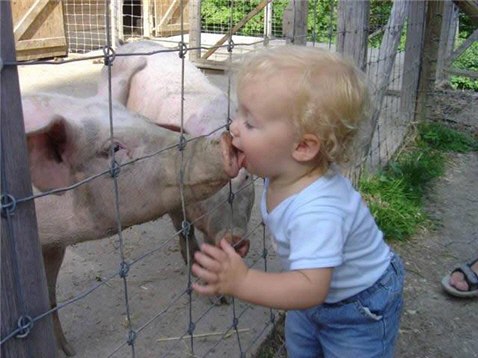Who’s Afraid of The Big Bad Swine?

Originally Written 5/29/09
Swine don’t have a good reputation. They are called all kinds of names: stupid, dirty, lazy or ugly, etc., depending on the occasion. No body wants to be called a pig. Now they are even accused of spreading a deadly disease, the so-called swine flu – they simply don’t get a break.
Let’s see some of the stuff that we are hearing about this swine flu.
This strain of novel influenza A (H1N1) first broke out in Mexico in April 2009. Some earlier reports had it that there were over 3,000 people ill with the disease and 83 people had died of it. Emergency measures had been announced by the president there.
Across the globe, figures from the World Health Organization (WHO) show that forty-six countries have confirmed 12,950 cases, including 96 deaths, according to the latest tally, and authorities say many more may have been sickened.
Eighteen European countries have confirmed 349 cases, a third of whom were probably infected in their home country. The U.K. and Spain have the most reported cases, with 133 each.
Japan has the most cases outside North America. Swine flu has hit the most populous urban area on earth when two schoolgirls in Tokyo tested positive for the disease as Japan's national total reached 345, reports and officials said.
China reported cases recently in Shanghai and the eastern province of Zhejiang, taking its tally of confirmed infections to 12. Taiwan confirmed the island’s first domestically transmitted case and reported two imported infections, giving it nine. South Korea confirmed 12 more cases, bringing its total to 22.
Closer to home, The United States now has over 6,000 probable and confirmed case of swine flu. New York has recently recorded its first death from swine flu - the sixth fatality overall in the US as an assistant school principal passed away a week after becoming ill in mid-May.
The news is definitely not good, and reports by the big media are overwhelmingly negative.
In the face of what they consider clear and apparent danger, the human’s natural defensive mechanism quickly kicks in, as evidenced by the walk-through thermal scans installed at international airports, the needless school closings, and of course, the TV images of those silly surgical masks on thousands of people’s faces.
“Better safe than sorry,” they say.
Fear has even made some people turn hostile against others. In China, a blog posting reporting a swine flu case brought by an overseas student who recently returned home from Canada stirred up nearly three thousand angry replies.
“Everybody is anxious now, what are they running around for?” One lamented, “Isn’t it nice enough out there? Why come back in this dangerous time and put us in danger?!”
“Those spoiled brats,” Another barked, “got nothing better to do but harm their own folks!”
The Vivid memory of past years’ truly deadly global epidemics such as SARS and the “Spanish flu” certainly weight heavily on people’s mind, so I can understand how they tend to get nervous right away when something with such a strange name comes along. As a result, you see canceled flights, schools closed due to a five percent absence rate, and over-crowded hospital emergency departments that have to set up tents outdoors to accommodate anxious patients with the first hint of a flu-like symptom.
The big media is not helping the case with frightening headline news that feeds into the frenzy. What we see when we turn on the news is often a serious looking reporter holding a microphone, standing in front of some supposed infected building and telling us the deadly virus epidemic shows no signs of slowing down, but we don’t have vaccines for the swine flu, and some baby had a fever, turned blue and die in the emergency room...
Little mentioned is that despite the fact that this strain of flu is new to human and thus most people will not have immunity to it, it is relatively mild and treatable even compared to some normal seasonal flues. And we won’t hear that every year, influenza circles the global and kills an estimated 250,000-500,000 people. In an average year, 36,000 of those people live in the United States — a country that spends more on health care than any other country. Compared to this, the number of swine flu cases that we are having now doesn’t seem overwhelming.
Besides, only less than half of reported new swine flu cases are eventually confirmed. Most of the swine flu deaths had underlying health ailments. And that sixteen months old boy that was rushed to the hospital did not die of the swine flu after all. If you were not paying attention, you would have missed this little bit of the news.
Medical terms are Greek to me, and I certainly don’t have adequate knowledge to give advice on this issue. But I reckon since it is flu, shouldn’t we just treat it like what it is, with common sense?
I happened to come across this from the CDC website about how to take everyday actions to stay healthy, which our mothers probably have been telling us since forever:
- Cover your nose and mouth with a tissue when you cough or sneeze. Throw the tissue in the trash after you use it.
- Wash your hands often with soap and water, especially after you cough or sneeze. Alcohol-based hands cleaners are also effective.
- Avoid touching your eyes, nose or mouth. Germs spread that way.
- Stay home if you get sick. CDC recommends that you stay home from work or school and limit contact with others to keep from infecting them.
Of course, swine, like other seasonal flues, is nothing to sneeze at. It is not going away and still spreading around the world. With the summer travel season approaching fast, we surely will not stop hearing about this big bad swine any time soon.
The good news is that progress has been made towards developing a viable H1N1 swine flu vaccine, with experts at the U.S. Centers for Disease Control and Prevention saying the week leading to the Memorial weekend that they have two promising candidate viruses for use in such a shot.
This swine may turn out to be big, and certainly bad, but do we really want to live a sorry fearful life in the name of being “safe”? Apparently many people don’t think so, as airlines are flying out of Mexico again; more schools are reopened; and friends are still shaking hands. Perhaps we can all sing:
“Who’s afraid of the big bad swine?”










